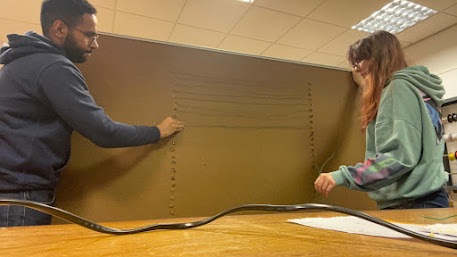Week 4

During this week, our group met 4 times, and attended 2 lab sessions. We had previously intended to use only one power supply, meaning every LED strip was already connected in parallel, so, in the first lab, we desoldered some of the wires that connected all of our LEDs in parallel. This meant that there were four sections of LED strips connected in parallel, which allowed us to power the LEDs with 4 different power supplies. Before we could test whether the LEDs would work, we were unsure of how to shut down the Raspberry Pi safely without using a monitor. We managed to resolve this issue by acquiring a small button from the technicians, which we then programmed to shutdown the Pi when it’s pressed. We then collected three 10A power supplies and wired each of them to 7 rows of LEDs, with the remaining 3 rows powered by a 3A bench supply. When we tested this, however, only 1 neopixel lit up (trust the process). In our next lab session, we realised that this was because the Neopixe...


